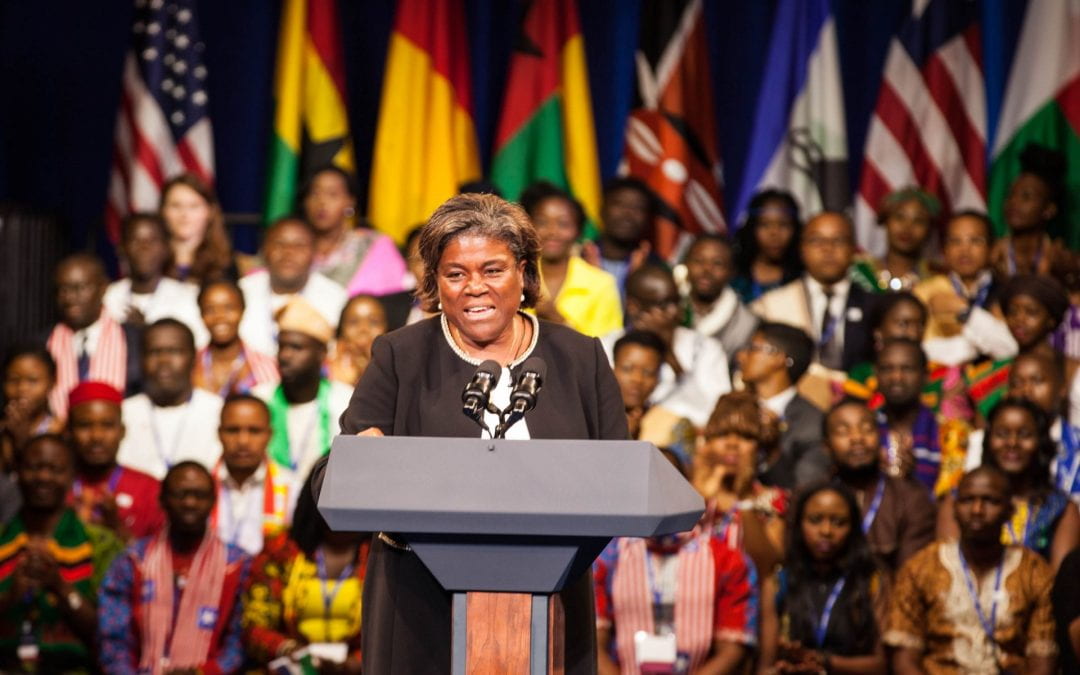On November 23, President-elect Joe Biden chose Linda Thomas Greenfield, a career diplomat, to serve as his Ambassador to the United Nations. The U.N. Ambassadors serve as the voice of the United States at the UN. They negotiate and promote foreign policy objectives of the United States during Security Council meetings, and may lobby for structural reforms to the institution or for appointments of member nations as non-permanent members to the Security Council.
Linda Thomas Greenfield grew up in a small segregated town outside of Baton Rouge, Louisiana at a time when the Ku Klux Klan regularly terrorized the African American community in the south. She was the first in her family to graduate high school. She continued her education at Louisiana State University and the University of Wisconsin-Madison for graduate school. She served for 35 years in the foreign service, including as Ambassador to Liberia, Director General of the Foreign Service, and as Assistant Secretary of State of African Affairs under President Obama. What could her appointment mean for US foreign relations and global affairs following four years of the Trump administration’s “America First” policy?
Notably, Biden has re-elevated the role of UN ambassador to a cabinet-level position, indicating that having Thomas-Greenfield in his cabinet was meant to ensure her voice was heard “on all the major foreign policy discussions.” This positioning of Thomas-Greenfield suggests that foreign affairs will be a higher priority for the executive office going forward.
Many fellow foreign service officers and diplomats see Thomas-Greenfield’s nomination as a large shift towards globalism and away from isolationism. Tapping Thomas-Greenfield for the position seems to have brought life and pride back into the foreign service. The Trump administration gutted and attacked many multilateral programs, like the World Health Organization, and the Human Rights Council, and left the Paris Climate Agreement. Appointing a career foreign service officer to the position of UN ambassador indicates the incoming administration values multilateral action and the work of the foreign service. During her acceptance of the nomination, Thomas-Greenfield said, “America is back, multilateralism is back, diplomacy is back.”
While this choice may signal a return to the status quo, one can also foresee Thomas-Greenfield’s appointment bringing about a new era of foreign relations and diplomacy. This past September she published an article along with William Burns addressing the need to modernize the foreign service department through technology updates and promotion of diversity in the traditionally male and white-dominated field. An updated and more diverse foreign service could mean more open relations with countries that traditionally do not feel heard or seen by the United States. Thomas-Greenfield has shown through her own work the power diversity can have in diplomacy. One State Department official told ABC News that Thomas-Greenfield’s ability to speak as a black-woman gave her credibility when urging other countries to improve their human rights record.
Thomas-Greenfield’s willingness to modernize and diversify institutions, such as the foreign service department, could foreshadow a willingness to address similar chronic issues at the UN. A long-standing critique of the UN is its inability to effect meaningful change or address problems it was designed to address, such as war, poverty, or famine, and its tendency to favor eurocentric policies. While it is unlikely one woman will single-handedly resolve these institutional weaknesses, it is possible for her to begin addressing these issues and lobby for structural reforms.
In addition to Thomas-Greenfield’s embrace of reform, her historic appointment as the first woman of color to the position could be an effort to restore some of the United State’s credibility within the UN. The United States has recently faced criticism from the UN for violent methods of policing targeted at racial minorities, detention and separation of migrant families along the US-Mexico border, and proliferation of guns. Thomas-Greenfield herself has faced racial discrimination in the United States, and can speak to both the nation’s shortcomings, as well as its intent and ability to better meet the standards of human rights it expects of other nations. In nominating Thomas-Greenfield, the new administration may be acknowledging these criticisms and signaling to the world its willingness to address them.
During a TED Talk in 2018, Thomas-Greenfield shared some of her personal story. As she spoke, the screen behind her that read, “I’m not trying to change the world. I just want to change one person.” Perhaps Thomas-Greenfield’s historic appointment as the first Black woman to this position, coupled with her own experience and desire to bring about change one person at a time, will mark a shift in both the UN and the United States to better fulfill their goals of promoting human rights and peace around the world.
Author Biography: Meredith Gusky is a senior moderator for the International Law and Policy Brief (ILPB) at The George Washington University Law School. She is a dual degree candidate at The George Washington Law School and The Elliott School of International Affairs.

